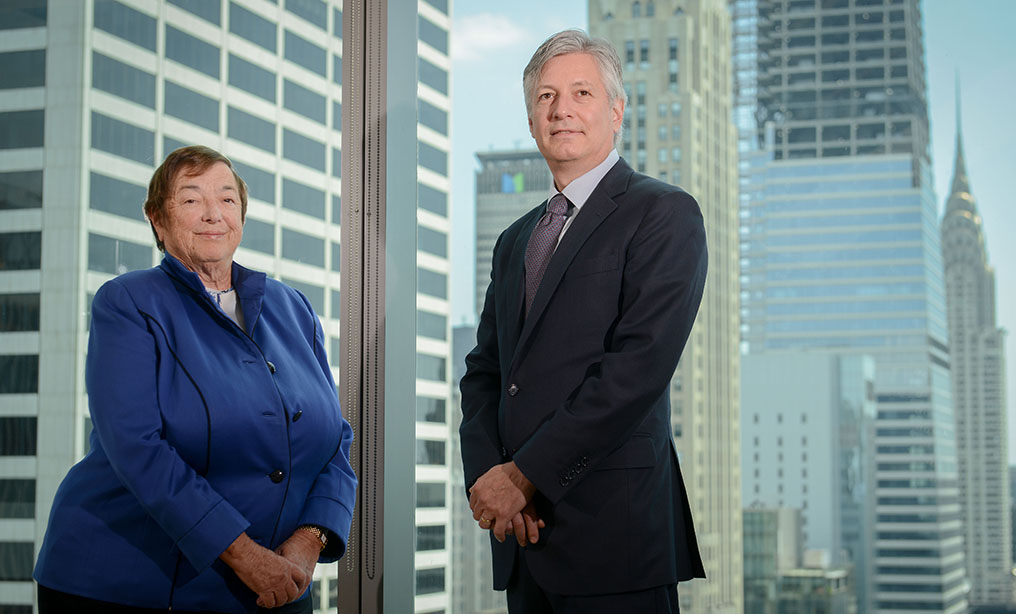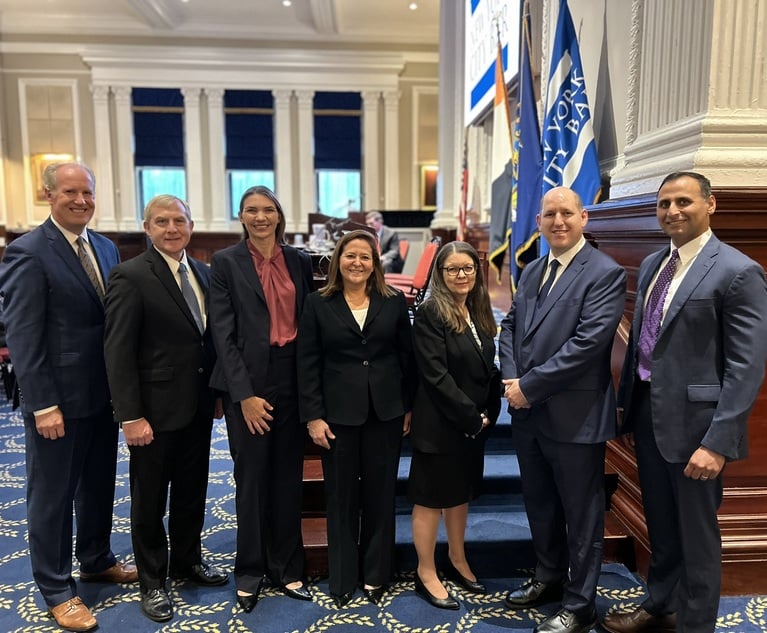Litigation Department of the Year, Products Liability: Dechert
Plenty of firms have strong leaders, but very few have such a lengthy list of senior lawyers with experience at the highest level—that's unusual and sets Dechert apart.
October 16, 2019 at 11:03 AM
4 minute read
 Sheila Birnbaum and Mark Cheffo, co-chairs of the products liability and mass torts practice (Photo by David Handschuh/NYLJ)
Sheila Birnbaum and Mark Cheffo, co-chairs of the products liability and mass torts practice (Photo by David Handschuh/NYLJ)
What are some of the department's most satisfying successes of the past year and why? It's been a really exciting and successful year. Dechert started the year with a huge appellate victory in the U.S. Court of Appeals for the Fourth Circuit for longtime firm client, Pfizer, involving its cholesterol-lowering drug, Lipitor. The Fourth Circuit affirmed the trial court's dismissal of an entire MDL consisting of more than 3,000 cases alleging that Lipitor caused type 2 diabetes. The court agreed with the trial court's determination that the plaintiffs' had not proffered scientifically reliable expert testimony supporting this theory. Dechert also represents Purdue Pharma as national defense counsel in the opioid litigations, consisting of some 1,300 federal cases aggregated in an MDL in Ohio, and hundreds more cases brought by state attorneys generals, cities, and municipalities. Dechert spearheaded a historic settlement with the state of Oklahoma where the settlement funds will be used to establish one of the largest and most innovative substance use disorder treatment centers in the country. Dechert has also won outright victories for Purdue in Connecticut, North Dakota, and South Dakota, and partial victories in a number of other states. Rounding out the year, Dechert won a significant appellate victory in the Second Circuit for client State Farm where the court sided with State Farm and rejected plaintiffs' attempt to force the company to pay for property damage caused by shoddy construction materials. The Second Circuit's decision—which correctly recognized that State Farm's policy excluded coverage for damages caused by the use of substandard construction materials—will foreclose many similar cases that had or could have been brought against State Farm.
A prospective client in crisis calls and asks why your team should be retained. What is your answer? The depth and breadth of our PLMT team is unmatched. Plenty of firms have strong leaders, but very few have such a lengthy list of senior lawyers with experience at the highest level—that's unusual and sets Dechert apart. Where we also excel is in being strategic at every turn. From the moment we're hired, even mid-crisis, we think strategically and plan for the long term. Our experience on the PR and media relations side also gives us some sophisticated tools to control the messages that clients need to get out.
What traits do you respect most in opposing firms and lawyers? Above all, we respect people with integrity. We admire those who keep their word. And, despite the contentiousness of the field of law in which we have chosen to work, we are always grateful when others find it in themselves to remain courteous.
What sorts of trends are you seeing in litigation, and what do you think will be the most important development in the law/legal business that will impact your field in the next 10 years? Dechert occupies a central place in the most prominent trends in product liability—opioid litigation, environmental toxic torts, and talc product claims—and we foresee an increase in this type of collective litigation in which state attorneys general, cities, counties and municipalities bring parallel actions across the country. The public nuisance approach we've seen in the opioid litigation sidesteps traditional defense strategies and raises a whole new set of questions about proximate liability. We're already seeing developments of this kind around access to clean water, where state, city and local government actors are focusing attention—often for the first time—on a whole range of chemicals and fertilizers that have been unregulated for decades.
What is the firm doing to ensure that future generations of litigators are ready to take the helm? Dechert is a high-performance firm with energy and drive, but it's also well-rounded, a certified "Great Place to Work" that's deeply serious about diversity, respects pro bono, promotes the arts, and strives to improve the lives of the people who work here. It's a place where people want to stay. Within PLMT, training and experience are vital factors in our success. Here, junior lawyers are asked to take depositions or argue motions in court, ensuring that everyone on the team accrues the kind of valuable experience that helps them become better lawyers and better leaders.
This content has been archived. It is available through our partners, LexisNexis® and Bloomberg Law.
To view this content, please continue to their sites.
Not a Lexis Subscriber?
Subscribe Now
Not a Bloomberg Law Subscriber?
Subscribe Now
NOT FOR REPRINT
© 2025 ALM Global, LLC, All Rights Reserved. Request academic re-use from www.copyright.com. All other uses, submit a request to [email protected]. For more information visit Asset & Logo Licensing.
You Might Like
View All
Elizabeth Cooper of Simpson Thacher on Building Teams in a 'Relationship Business'
4 minute read
For Paul Weiss, Progress Means 'Embracing the Uncomfortable Reality'
5 minute read
Kenneth Feinberg Had Dreams of Being on the Big Screen. His 9/11 Victims Fund Gave Him an Unexpected Star Turn

City Bar Holds 32nd Annual Henry L. Stimson Medal Presentation
Trending Stories
- 1Judge Pauses Deadline for Federal Workers to Accept Trump Resignation Offer
- 2DeepSeek Isn’t Yet Impacting Legal Tech Development. But That Could Soon Change.
- 3'Landmark' New York Commission Set to Study Overburdened, Under-Resourced Family Courts
- 4Wave of Commercial Real Estate Refinance Could Drown Property Owners
- 5Redeveloping Real Estate After Natural Disasters: Challenges, Strategies and Opportunities
Who Got The Work
J. Brugh Lower of Gibbons has entered an appearance for industrial equipment supplier Devco Corporation in a pending trademark infringement lawsuit. The suit, accusing the defendant of selling knock-off Graco products, was filed Dec. 18 in New Jersey District Court by Rivkin Radler on behalf of Graco Inc. and Graco Minnesota. The case, assigned to U.S. District Judge Zahid N. Quraishi, is 3:24-cv-11294, Graco Inc. et al v. Devco Corporation.
Who Got The Work
Rebecca Maller-Stein and Kent A. Yalowitz of Arnold & Porter Kaye Scholer have entered their appearances for Hanaco Venture Capital and its executives, Lior Prosor and David Frankel, in a pending securities lawsuit. The action, filed on Dec. 24 in New York Southern District Court by Zell, Aron & Co. on behalf of Goldeneye Advisors, accuses the defendants of negligently and fraudulently managing the plaintiff's $1 million investment. The case, assigned to U.S. District Judge Vernon S. Broderick, is 1:24-cv-09918, Goldeneye Advisors, LLC v. Hanaco Venture Capital, Ltd. et al.
Who Got The Work
Attorneys from A&O Shearman has stepped in as defense counsel for Toronto-Dominion Bank and other defendants in a pending securities class action. The suit, filed Dec. 11 in New York Southern District Court by Bleichmar Fonti & Auld, accuses the defendants of concealing the bank's 'pervasive' deficiencies in regards to its compliance with the Bank Secrecy Act and the quality of its anti-money laundering controls. The case, assigned to U.S. District Judge Arun Subramanian, is 1:24-cv-09445, Gonzalez v. The Toronto-Dominion Bank et al.
Who Got The Work
Crown Castle International, a Pennsylvania company providing shared communications infrastructure, has turned to Luke D. Wolf of Gordon Rees Scully Mansukhani to fend off a pending breach-of-contract lawsuit. The court action, filed Nov. 25 in Michigan Eastern District Court by Hooper Hathaway PC on behalf of The Town Residences LLC, accuses Crown Castle of failing to transfer approximately $30,000 in utility payments from T-Mobile in breach of a roof-top lease and assignment agreement. The case, assigned to U.S. District Judge Susan K. Declercq, is 2:24-cv-13131, The Town Residences LLC v. T-Mobile US, Inc. et al.
Who Got The Work
Wilfred P. Coronato and Daniel M. Schwartz of McCarter & English have stepped in as defense counsel to Electrolux Home Products Inc. in a pending product liability lawsuit. The court action, filed Nov. 26 in New York Eastern District Court by Poulos Lopiccolo PC and Nagel Rice LLP on behalf of David Stern, alleges that the defendant's refrigerators’ drawers and shelving repeatedly break and fall apart within months after purchase. The case, assigned to U.S. District Judge Joan M. Azrack, is 2:24-cv-08204, Stern v. Electrolux Home Products, Inc.
Featured Firms
Law Offices of Gary Martin Hays & Associates, P.C.
(470) 294-1674
Law Offices of Mark E. Salomone
(857) 444-6468
Smith & Hassler
(713) 739-1250






